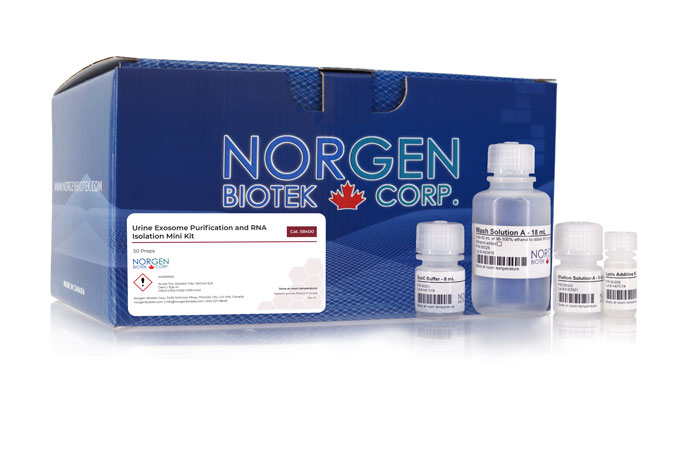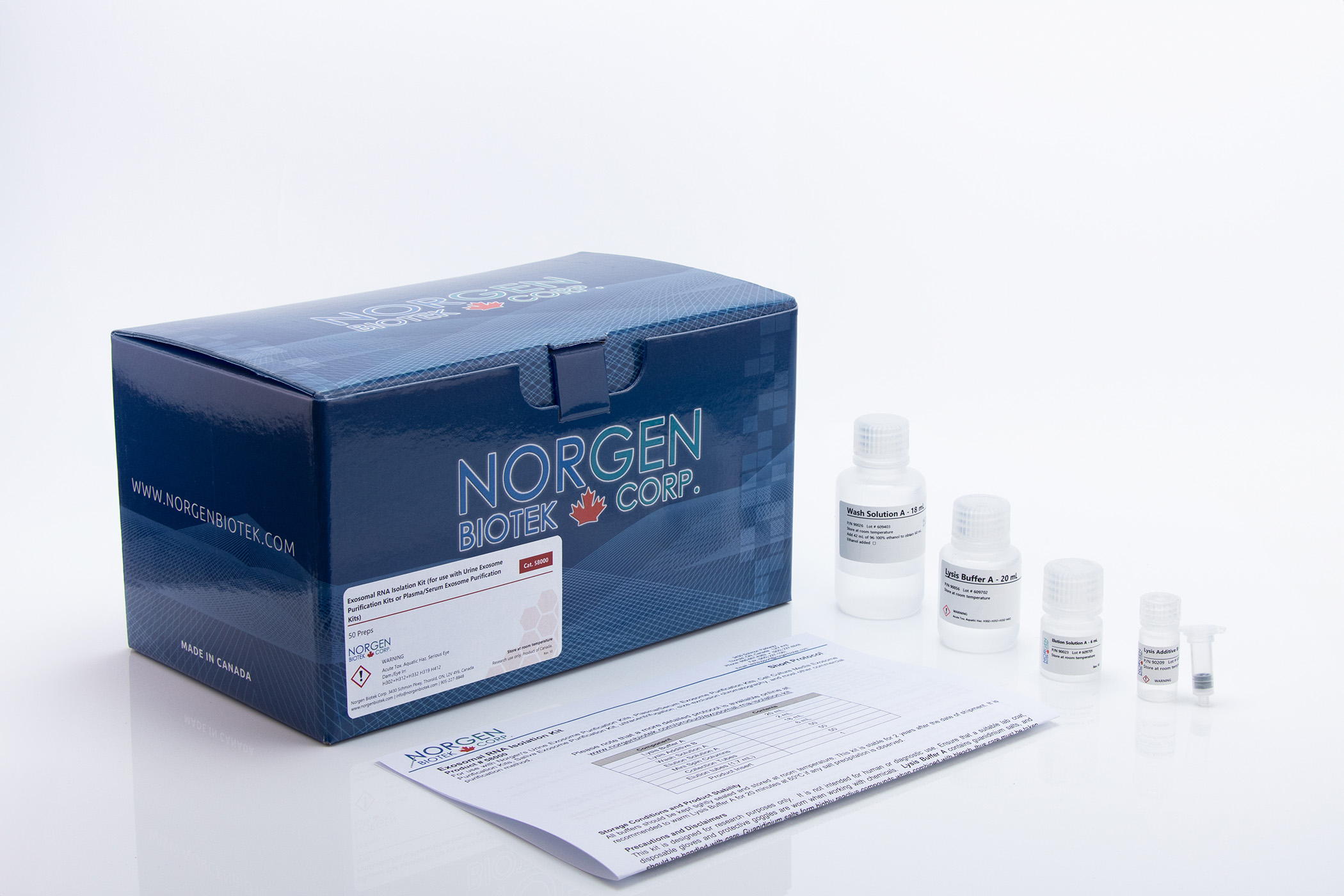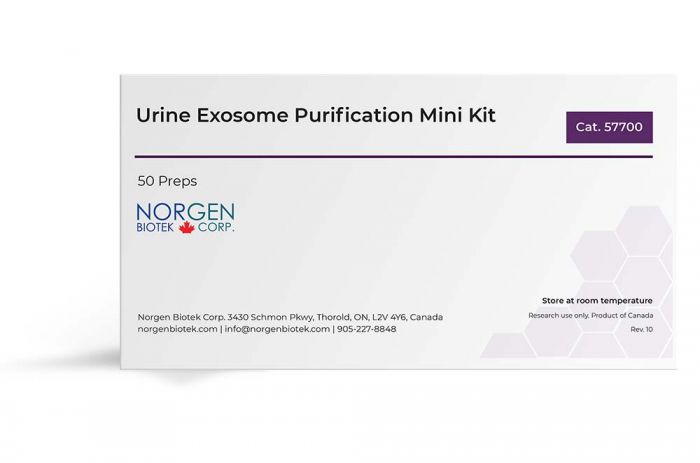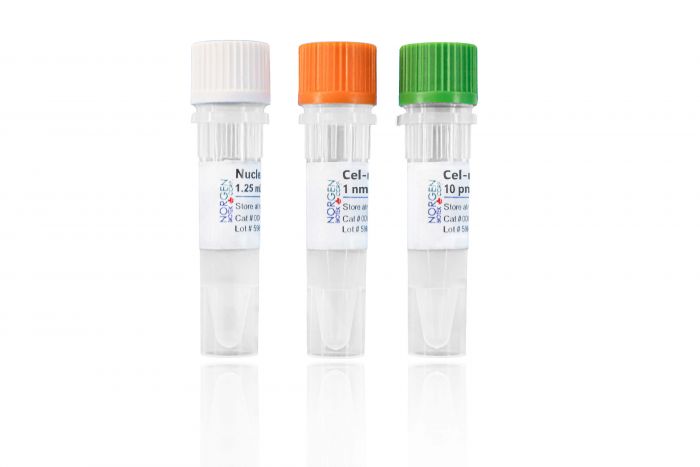Urine Exosome RNA Isolation Kit
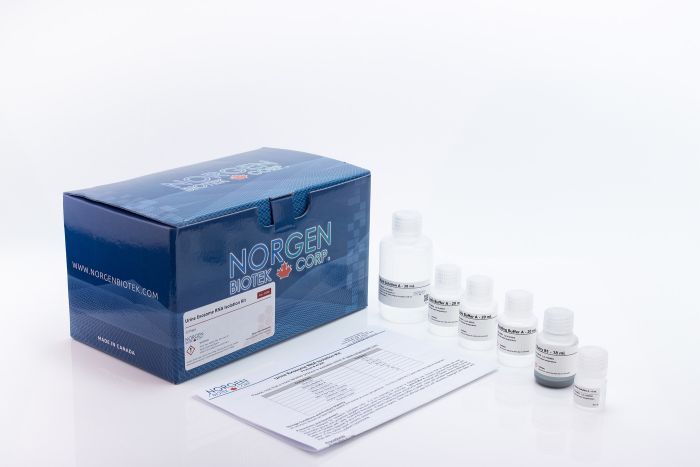
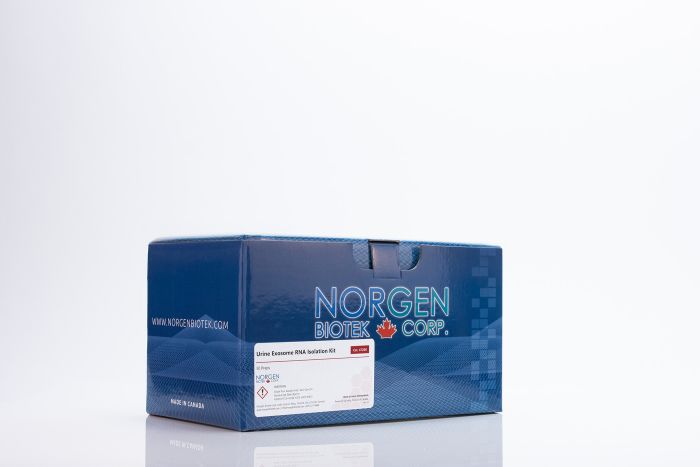
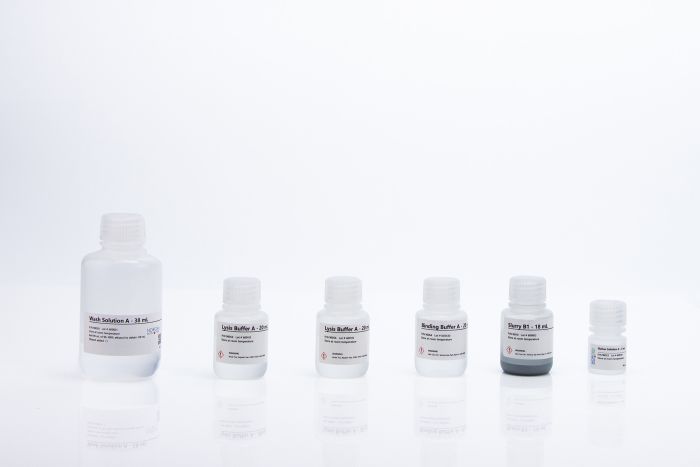
For research use only and NOT intended for in vitro diagnostics.
Urine Exosome RNA Isolation Kit
Register today to receive an exclusive 15% off* on your first order.
Supporting Data
Figure 1. Detection of Urine Exosomal RNA Isolated from Different Urine Volumes. Norgen's Urine Exosome RNA Isolation Kit was used to isolate urine exosomal RNA from different urine volumes ranging from 1 to 15 mL. The purified urine exosomal RNA was then used as the template in an RT-qPCR reaction to detect the human 5S rRNA. 3 μL of the isolated urine exosomal RNA was used as the template in the RT step, and 3 µL from the RT step was used in the qPCR reaction. As it can be seen, the qPCR was able to successfully detect and amplify the 5S rRNA from exosomal RNA isolated from different urine volumes, indicating its high quality.
Figure 2. Effective and Consistent Detection of Urine Exosome RNA. Norgen's Urine Exosome RNA Isolation Kit can effectively isolate RNA from urine. Urine exosome RNA was isolated from 5 mL of human cell-free urine using Norgen's Urine Exosome RNA Isolation Kit (green), ExoQuick-TC Exosome Precipitation Reagent (blue) and Amicon® Ultra-15 Filter (blue). Stem loop RT-qPCR using primers specific to miR-21 and miR-16 as well as the housekeeping 5S rRNA was performed. In brief, three microliters of the 100 µL isolated RNA was then subjected to a 20 µL reverse transcription reaction using 5S rRNA, miR-21 and miR-16 stem-loop reverse primer or reverse primer. 3 μL from the reverse transcription reaction was used in a 20 µL real-time PCR reaction with primers to detect the human miR-21, human miR-16 and the 5S rRNA. Norgen's Urine Exosome RNA Isolation Kit is the only product that showed consistent detection of all tested transcripts with the highest quality.
Figure 3. High Diversity and Consistency of miRNA Recovered from Urine. Mid-stream urine was collected from three different healthy individuals. RNA was isolated from 20 mL of each sample using Norgen's Urine Exosome RNA Purification Kit (Cat. 47200). Small RNA Libraries were then generated using an Illumina TruSeq Small RNA Library Preparation Kit and subsequently sequenced on an Illumina MiSeq system. The normalized read counts of the mapped miRNAs were then compared between each individual sample. The scatter plots showed that the miRNA diversity was highly conserved among all individuals tested (R2 ≥ 0.92). This suggests that Norgen's RNA purification workflow recovers consistent profiles of small RNAs. This could enhance the possibility of detecting potential urine-based small RNA biomarkers.
Figure 4. High Degree of Overlapping of miRNA profile between Urine and Plasma. Plasma and mid-stream urine was collected from three different healthy individuals. RNA was isolated from 20 mL of each urine sample using Norgen's Urine Exosomal RNA Purification Kit (Cat. 47200) and 200 µL of each plasma sample using Norgen's Plasma/Serum RNA Purification Mini Kit (Cat. 55000). Small RNA Libraries were then generated using an Illumina TruSeq Small RNA Library Preparation Kit and subsequently sequenced on an Illumina MiSeq system. The list of mapped miRNAs from plasma and urine from the same individual was then compared. The Venn diagrams showed that the miRNA profiles have a high degree of overlapping between urine and plasma within each individual.
Figure 5. Increased Diversity of Other Small RNA Species (Piwi-Interacting) in Urine. Plasma and mid-stream urine was collected from three different healthy individuals. RNA was isolated from 20 mL of each urine sample using Norgen's Urine Exosomal RNA Purification Kit (Cat. 47200) and 200 µL of each plasma sample using Norgen's Plasma/Serum RNA Purification Mini Kit (Cat. 55000). Small RNA Libraries were then generated using an Illumina TruSeq Small RNA Library Preparation Kit and subsequently sequenced on an Illumina MiSeq system. The above chart shows that the relative proportion of piwi-interacting RNA (piRNA) was consistently higher in urine.
Figure 6. Western blot analysis of Norgen-enriched uEVs (urinary Extracellular Vesicles) from BPH (benign prostatic hyperplasia) and PCa (Pancreatic Cancer) urine samples. (Royo F, et al. Different EV enrichment methods suitable for clinical settings yield different subpopulations of urinary extracellular vesicles from human samples. Journal of Extracellular Vesicles. 2016;5:10.)
Figure 7. EV pellets recovered by Norgen’s Urine Exosome RNA Isolation Kit (Cat. 47200) kit were visualised by EM (Electron Microscopy) for sizing (Crossland RE, Norden J, Bibby LA, Davis J, Dickinson AM. Evaluation of optimal extracellular vesicle small RNA isolation and qRT-PCR normalisation for serum and urine. J Immunol Methods. 2016 Feb;429:39-49.)
|
Kit Specifications
|
|
| Minimum Urine Input |
1 mL
|
| Maximum Urine Input |
10 mL
|
| Size of RNA Purified |
Small exosomal RNA species
|
| Time to Complete Purification |
~ 50 minutes
|
Storage Conditions and Product Stability
All buffers should be kept tightly sealed and stored at room temperature. This kit is stable for 2 years after the date of shipment.
| Component | Cat. 47200 (50 preps) |
|---|---|
| Slurry B1 | 18 mL |
| Binding Buffer A | 20 mL |
| Lysis Buffer A | 2 x 20 mL |
| Wash Solution A | 38 mL |
| Elution Solution A | 6 mL |
| Mini Filter Spin Columns | 50 |
| Collection Tubes | 50 |
| Elution Tubes (1.7 mL) | 50 |
| Product Insert | 1 |



